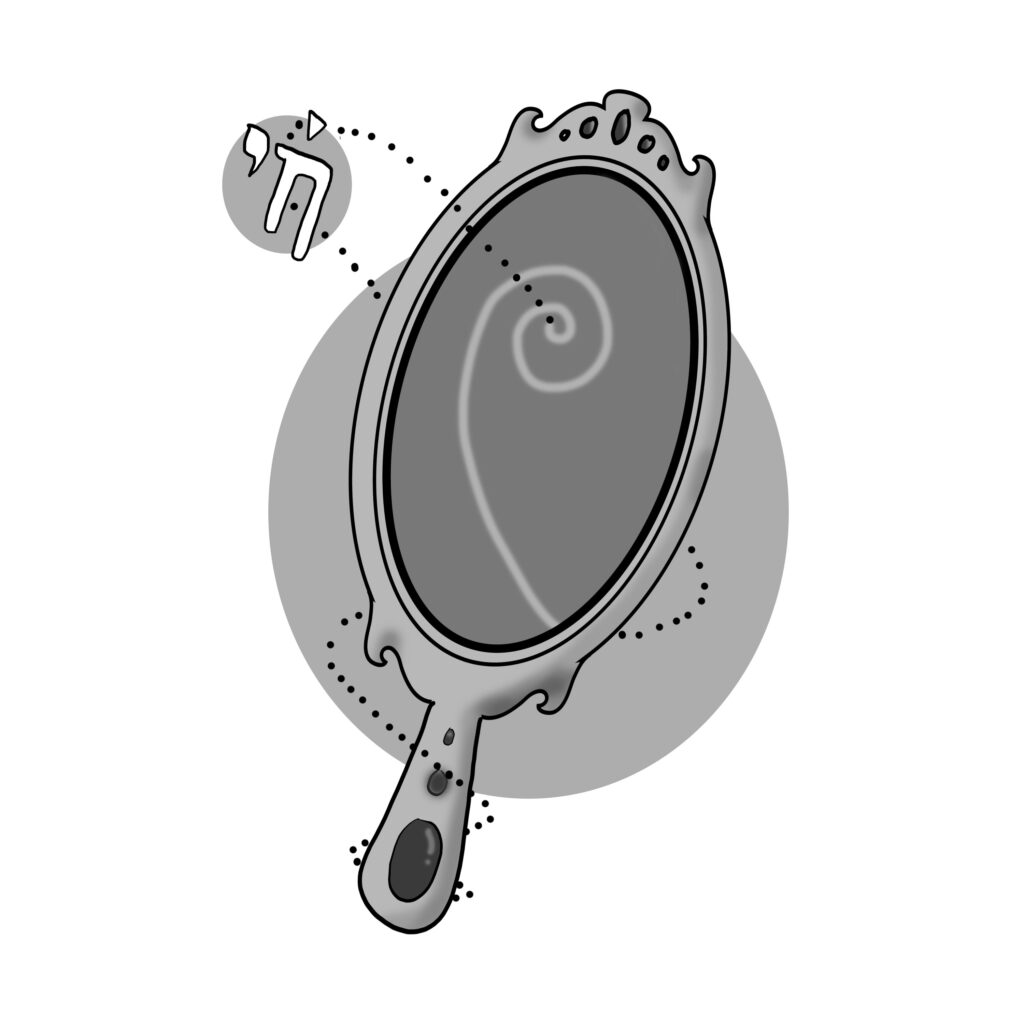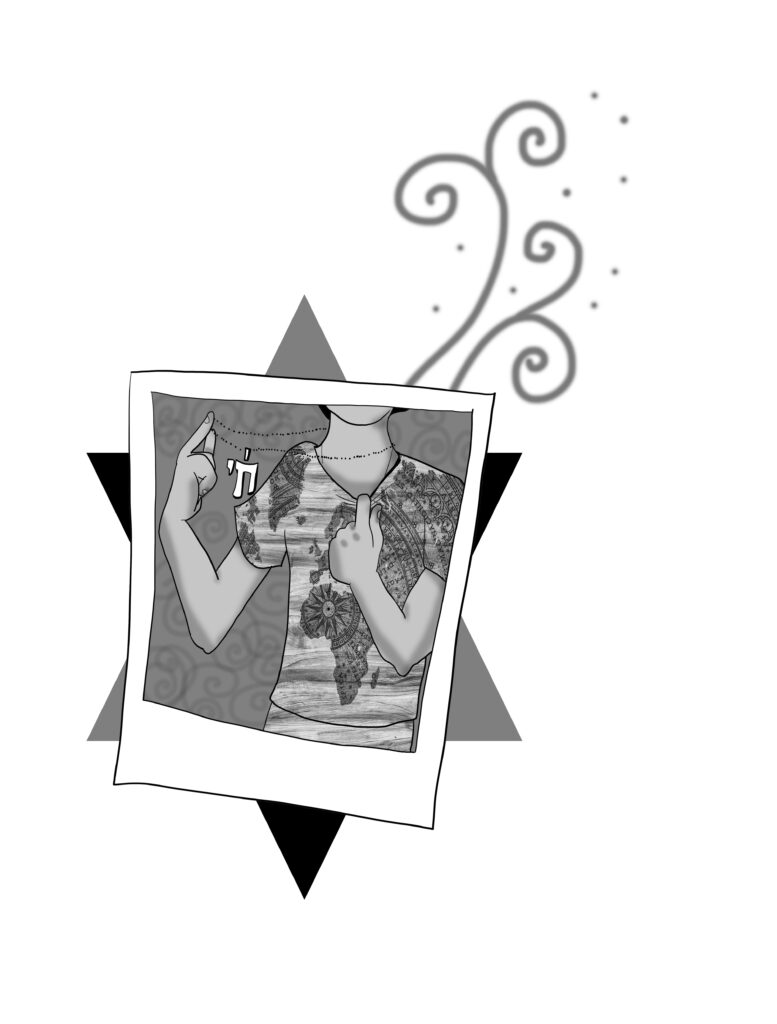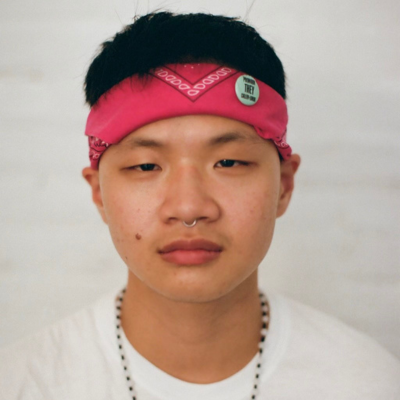The following is an excerpt from Fragments, the new magazine from Emor.
by Jules Duze
are you Jewish, or are you Jew-ish?
what’s the difference?
i knew our birthright well,
better than the back of my hand,
at one point in my life.
the Jewish claim to fame,
we are the Chosen people,
thus, we are _ by those who are not us,
(you can fill it out yourself with whatever feels right
to you)
we have endured Pogroms, the Inquisition, the
Romans,
we have endured the hatred, we have endured the
jealousy, we have endured Babylon,
we have survived the Amaleks, we have survived the
Egyptians, we have survived Adam and Eve.
we have survived the Holocaust.
to be a Jew is to be a Survivor,
against all odds.
my heart aches for those who were mercilessly murdered,
my heart has carried that pain for as long as i have known Judaism,
for as long as i can remember: “be proud to be Jewish, but be careful
who you tell”
a secret that could get you killed.
what about the parts of me that I can’t keep secret?
my “oriental” eyes.
(Said said it first)
my fine Black hair.
my slender shoulders and wider hips,
the softness of my voice, that i hope to never lose.
my scars.
what about the parts that I don’t get to choose if people are privy to?
will i get pushed off the platform like Michelle Alyssa Go?
will i get shot while having fun with friends like our fallen siblings at
Pulse or Club Q?
what did it mean “to be Jewish”?
i didn’t go to day school. i didn’t know all the prayers. i couldn’t
understand Hebrew. (though i can read it)
what made me Jewish?
i wore my magen david with pride,
dutifully,
religiously you may even say
i had a coming of age ceremony when i turned 13.
read re’eh from the torah,
and recited the accompanying haftarah.
danced our sacred scroll around the sanctuary,
and led the congregation in prayer – cautiously.
i went to youth group every sunday,
and shacharit services every saturday,
and hebrew school every monday and wednesday.
these choices were made mostly for and by a mother.
i have/had
(i am still deciding, a story for another time and place)
as stereotype states, a very Jewish mother.
limited edition, deluxe guilt package.
(if parents are not careful, they will raise receptacles of regret rather
than children)

a bit about her:
she was/is a second generation American,
the only daughter (and her dog) to a couple of refugees from Vienna,
Austria who never healed the harm that the Holocaust havoced.
she did not receive a Jewish education,
did not grow up going to synagogue,
has not had a bat mitzvah,
and was not offered the opportunity to embrace our religion.
our religion that led to her existence,
our religion that prompted her parents’ persecution,
our religion that ruined their lives,
because they were never able to find the silver lining.
so she tried to give it to her children,
passing down the pain and pushing to provide
what she had longed for but did not receive,
due to prioritization of potential safety.
being Jewish took everything from her parents,
(her mother was 16 when she escaped, never seeing her immediate
family again)
why would they want to bring this burden to their beloved child?
mother’s parents were refugees of a war they had not begun,
were never able to truly end.
something i learned
is that it is not what you say,
rather how you say it
for example:
my dad died three years ago;
his memory is a blessing and i have learned more
from him in his absolute absence,
than fear allowed me to learn while he was present.
a great Jewish example is Purim.
imagine we told the story like this:
“i’ve lost count of how many times people have tried to eradicate us,
H*man was not the first, and probably not the last, how difficult and
depressing.”
rather than
“a joyous jubilation of how a bad man tried to kill us, we prevailed
thanks to Esther and Mordechai, hooray!”
in the words of Lucille Clifton:
come celebrate
with me that everyday
something has tried to kill me
and has failed.
to be Jewish is to be a Survivor,
for i have lost track,
lost count of how many people have tried to kill us and failed.
targeting our visible difference (those who proudly and passionately
abide by as many of our laws as possible),
our gravitation to gathering (we love community so much that there
are certain prayers that cannot be said unless there is a minyan — ten or
more are present!)
and so, if we as a people are survivors, in every sense of that word do we
also hold survivor’s guilt?
(a particular kind of guilt that forms when you survived a life-
threatening event when others did not)

what do you do with guilt?
do you let it fester into grief — the depths of despair swallowing you whole,
siloing you into a singular mindset that your sole suffering is the only
one that matters,
that you are the only one who has experienced excruciating emotions?
hurt people hurt people.
if we told the Passover story from the point of view of the parts of the
population that lost;
would it be the same story?
what does the tale sound like from those who feared the Egyptians
more than they fostered faith in an unseen entity?
the ones who lost their firstborns along with their oppressors?
i wonder how they told their Exodus story. i wonder how they handled
their Survivor’s guilt.
speaking of Exodus…
23:9 “You shall not oppress a stranger, for you know the feelings of the
stranger, having yourself been strangers in the land of Egypt.”
how about our shared holy land?
the land of milk and honey,
the land that Moses could not step foot into,
but was allowed to gaze upon from afar — his penance for his
petulance,
accountability for his own brief breach of faith.
since my Sunday school days, i have grappled with the division i deduced,
between those who are in support of Israel, and those who are opposed.
yet another binary that i felt bound to — before i broke free.
hurt people hurt people.
pushed out populations. pogroms. plight.
the minority.
discernible difference.
displaced, diaspora.
in 1948, in wake of war crimes and forced expulsion
the State of Israel was born.
though the state of Israel had been around for centuries,
(Israel was a nickname for Jacob; one who prevails with G-d,)
earned through grappling with the divine stranger.
and yet, we wage a war we did not begin.
Survivors’ guilt festering into a vehemence.
in order to never be pushed out again,
we will be the ones to do the pushing.
hurt people hurt people…
so when does the healing begin?
i want to know, because that’s what i have been exploring:
how do we heal the wounds we did not face, yet ferry the phantom pain?
how do we address what did not directly experience,
but are reminded on a regular basis.
being visibly different (non-white), within vastly Conservative Jewish
spaces,
i often wondered if we did share the same ancestors,
i always felt watched; i could feel the eyes — the stares,
never approached; rarely welcomed.
i felt like a stranger amongst My people,
and a stranger amongst my People,
i grew up wondering if i would ever find My People.
I did.
I found them in my fellow Fellows.
I found them while Repair(ing) the World.
I found them finally speaking out, for someone else, because I finally
saw mySelf.
my late global teacher told me that those who do not learn from
history are doomed to repeat it.
so,
Will we be brave and bold enough to venture out into the sea of the
unknown, like Nahshon did?
can We leave the comfort of the lives we’ve built to come together for
the greater good, like Moses did?
are We going to welcome and care for strangers like Abraham did?
I hope so, I am learning how to, because I didn’t always.
i was siloed in my suffering for so much longer than I would like to admit.
if there is anything I want you to have taken from my words (and time
and experience)
is that I learned that being Jewish is a Choice, and there is Power in
Choosing.
We get to choose guilt or grief or Gratitude or Growth.
What will You Decide to Do?

Joules Huang Duze (they/them) is a writer, educator, and Doer. Born in China and raised in Queens, they were raised within the congregation of Hillcrest Jewish Center in Fresh Meadows. Post graduation from Macaulay Honors College, they began organizing with Black Trans Liberation. They walk the world as a genderqueer, neurodivergent, elder sibling, and perpetual student. In their free time, you can find them exploring nature, biking, whittling wood, reading, and spending time with
people they love.
